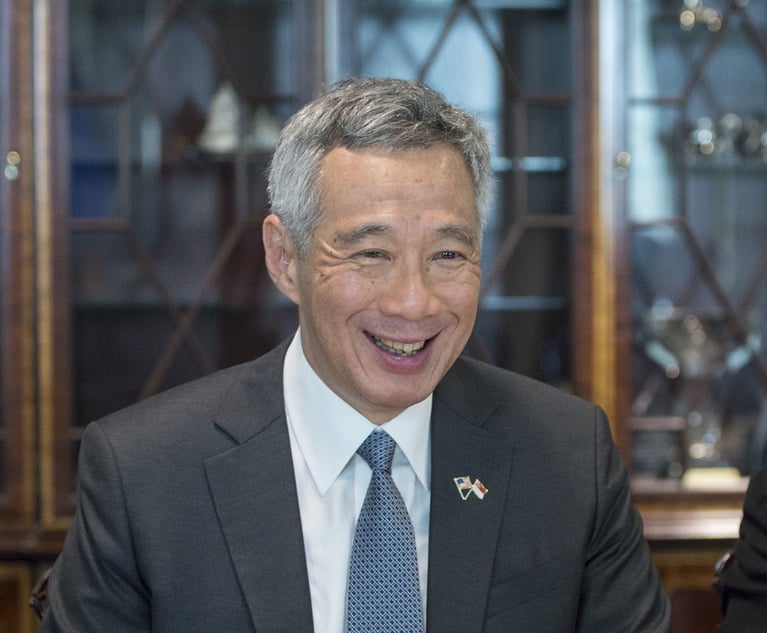K&L Gates and Australia's Middletons approve January merger
K&L Gates is to merge with Australian firm Middletons from January next year, creating a 2,000 lawyer law firm with 46 offices worldwide. Confirmation of the tie-up earlier today (4 December) comes after 533 equity partners across both firms voted unanimously this week to combine their resources through a full financial and operational merger from 1 January, 2013.
December 04, 2012 at 04:30 AM
4 minute read
K&L Gates is to merge with Australian firm Middletons from January next year, creating a 2,000 lawyer law firm with 46 offices worldwide.
Confirmation of the tie-up earlier today (4 December) comes after 533 equity partners across both firms voted unanimously this week to combine their resources through a full financial and operational merger from 1 January, 2013.
The deal will see K&L Gates take on 300 Middletons lawyers including 70 partners across four offices in Australia – Melbourne, Sydney, Perth and Brisbane – with the firm operating globally as K&L Gates.
It will have a single profit pool with a single firm-wide, merit-based remuneration scheme.
K&L Gates chairman and global managing partner Peter Kalis will remain head of the firm, with Middletons national managing partner Nick Nichola becoming Australia managing partner.
In an interview with Legal Week, Kalis said there would be no consolidation of offices or cut backs following the integration.
"There's not going to be any consolidation of offices, nor will there be any restructuring of the current offices in Australia or their personnel. This is a very solid foundation for us, and we wish to build on it the way it is – not subtract."
He added that there would be no major changes for staff in Australia except for the obvious adjustments that come with a merger.
"One of the really appealing things about the combination is how similar the cultures of the two firms are. You hear reports of other firms combining where they have great cultural dislocation. But Middletons does business in very much the same way as K&L Gates does business."
Pittsburgh headquartered K&L Gates confirmed it was talking to Middletons in August this year.While there has been growing interest in Australia from both UK and US firms, the deal is the first full merger between a large US firm and an Australian outfit, with K&L Gates following the lead of UK counterparts such Herbert Smith, which merged with Freehills on 1 October, Norton Rose, which merged with Deacons in 2010 and Ashurst, which has already combined with legacy Blake Dawson now Ashurst Australia, with the two firms planning to financially merge from 2014.
As well as giving K&L Gates access to Australia, where US direct investment has totaled more than $500bn (£310bn) since 2005, and its natural resources market, the combination will also enhance K&L Gates capabilities across practice areas including biotech and life sciences, IP, employment and projects.
Meanwhile for Middletons the union means access to US, European and Asian markets.
"The opportunities that this will open up for our staff, at all levels but particularly the younger members are tremendous," said Nichola.
"We came to the conclusion that the successful firms of the future would polarise into two categories – they would be your niche specialist boutique firms and then the well-resourced, full-service commercial firms that truly compete on a global scale. And we made a decision that we wanted to be the latter.
"We had spoken to a number of other firms prior to K&L, but very early on, it was very evident that K&L was a firm that was similar to us."
Australia has proven to be an attractive market for international law firms in the last 12 months, with a whole spate of UK outfits announcing a variety of different unions with Australia's best-known national firms.
Other examples of firms tapping the Australian market include the King & Wood Mallesons merger and the alliance between Linklaters and Allens. Meanwhile, Squire Sanders opened offices in Sydney and Perth this year.
One Australian partner in management at a rival firm commented: "Middletons was once one of the top firms in Australia but has slowly dropped down to the low-mid tier because it did not nationalise in the way the top Australian firms did in the 1980s. I expect they are now trying to make a move to compensate for this and grow their footprint. This merger will not have much of an effect on the market but I expect it will be good for the respective firms individually."
Related:
This content has been archived. It is available through our partners, LexisNexis® and Bloomberg Law.
To view this content, please continue to their sites.
Not a Lexis Subscriber?
Subscribe Now
Not a Bloomberg Law Subscriber?
Subscribe Now
NOT FOR REPRINT
© 2025 ALM Global, LLC, All Rights Reserved. Request academic re-use from www.copyright.com. All other uses, submit a request to [email protected]. For more information visit Asset & Logo Licensing.
You Might Like
View All
Singapore Leaders Stress the Importance of the Rule of Law Amid Geopolitical Tensions

Can Law Firms Avoid Landing on the 'Enemy' List During the Trump Administration?
5 minute read

Letter From Asia: Will Big Law Ever Bother to Understand Asia Again?
Trending Stories
Who Got The Work
J. Brugh Lower of Gibbons has entered an appearance for industrial equipment supplier Devco Corporation in a pending trademark infringement lawsuit. The suit, accusing the defendant of selling knock-off Graco products, was filed Dec. 18 in New Jersey District Court by Rivkin Radler on behalf of Graco Inc. and Graco Minnesota. The case, assigned to U.S. District Judge Zahid N. Quraishi, is 3:24-cv-11294, Graco Inc. et al v. Devco Corporation.
Who Got The Work
Rebecca Maller-Stein and Kent A. Yalowitz of Arnold & Porter Kaye Scholer have entered their appearances for Hanaco Venture Capital and its executives, Lior Prosor and David Frankel, in a pending securities lawsuit. The action, filed on Dec. 24 in New York Southern District Court by Zell, Aron & Co. on behalf of Goldeneye Advisors, accuses the defendants of negligently and fraudulently managing the plaintiff's $1 million investment. The case, assigned to U.S. District Judge Vernon S. Broderick, is 1:24-cv-09918, Goldeneye Advisors, LLC v. Hanaco Venture Capital, Ltd. et al.
Who Got The Work
Attorneys from A&O Shearman has stepped in as defense counsel for Toronto-Dominion Bank and other defendants in a pending securities class action. The suit, filed Dec. 11 in New York Southern District Court by Bleichmar Fonti & Auld, accuses the defendants of concealing the bank's 'pervasive' deficiencies in regards to its compliance with the Bank Secrecy Act and the quality of its anti-money laundering controls. The case, assigned to U.S. District Judge Arun Subramanian, is 1:24-cv-09445, Gonzalez v. The Toronto-Dominion Bank et al.
Who Got The Work
Crown Castle International, a Pennsylvania company providing shared communications infrastructure, has turned to Luke D. Wolf of Gordon Rees Scully Mansukhani to fend off a pending breach-of-contract lawsuit. The court action, filed Nov. 25 in Michigan Eastern District Court by Hooper Hathaway PC on behalf of The Town Residences LLC, accuses Crown Castle of failing to transfer approximately $30,000 in utility payments from T-Mobile in breach of a roof-top lease and assignment agreement. The case, assigned to U.S. District Judge Susan K. Declercq, is 2:24-cv-13131, The Town Residences LLC v. T-Mobile US, Inc. et al.
Who Got The Work
Wilfred P. Coronato and Daniel M. Schwartz of McCarter & English have stepped in as defense counsel to Electrolux Home Products Inc. in a pending product liability lawsuit. The court action, filed Nov. 26 in New York Eastern District Court by Poulos Lopiccolo PC and Nagel Rice LLP on behalf of David Stern, alleges that the defendant's refrigerators’ drawers and shelving repeatedly break and fall apart within months after purchase. The case, assigned to U.S. District Judge Joan M. Azrack, is 2:24-cv-08204, Stern v. Electrolux Home Products, Inc.
Featured Firms
Law Offices of Gary Martin Hays & Associates, P.C.
(470) 294-1674
Law Offices of Mark E. Salomone
(857) 444-6468
Smith & Hassler
(713) 739-1250








